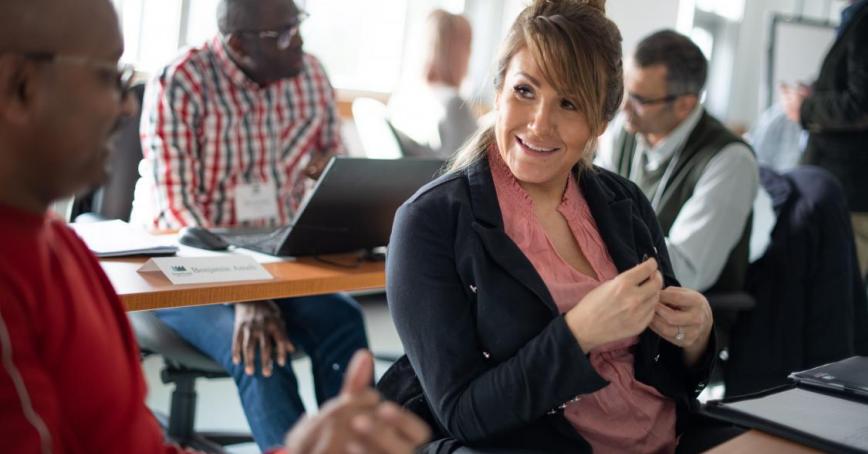DBA: Sending business back to school

When Hassan Wafai and his colleagues were designing Royal Roads University’s Doctor of Business Administration program, they set out to turn the traditional DBA inside-out.
Or is it outside-in?
They knew they wanted a program that would build on the success of the university’s Doctor of Social Sciences as well as the Faculty of Management focus on applied research.
They knew there were plenty of doctoral programs at other institutions that were adept at turning out university professors and researchers but not as equipped to produce business and community leaders who can make an impact in their industry or sector.
And they knew they wanted a DBA whose mandate was to educate and elevate working professionals.
“We saw there was a need for an applied doctoral degree that responds to the changing landscape of doctoral education in Canada,” says DBA Program Head Wafai.
And the key, he says, was a decision to bring the business world — specifically, the problems business people encounter — into the academic setting.
“In a traditional doctoral program, a PhD candidate looks at existing research and literature to find a gap in knowledge, then works with an advisor to design their own research to fill that gap,” says Wafai. “In Royal Roads’ DBA, students are able to do that but, alternatively, those with experience in management and leadership can work with faculty to create research to find solutions that can then be enacted in an industry.”
Indigenous business
The business challenge that DBA student Tasha Brooks brought to Royal Roads was close to home both geographically and professionally. A member of the Cowichan Tribes First Nation who lives on its traditional territories in Duncan, B.C., she has run small businesses of her own and is chair of the Cowichan Tribes Fishing Enterprise board.
She brought plenty of academic experience; she holds an MBA, a Master of Science in International Management and a Bachelor of Business Administration from Vancouver Island University, where she also worked as an Indigenous education advisor and taught Introduction to Management. Brooks started her DBA at a university in the USA before transferring to RRU.
She also brought this question: With hundreds of millions of dollars of funding available for Indigenous businesses in Canada, why do so few such enterprises take advantage of the support?
The simple, reductive answer, she explains, is that the problem lies in the distinct natures of Indigenous Peoples in Canada — First Nations, Métis and Inuit — and the failure of providers of such supports to approach entrepreneurs from each group in a unique way and in a manner suitable to each culture.
“At my other university, I had to constantly justify why I was engaged in researching Indigenous entrepreneurs and Indigenous development, and why it was a viable area of research,” says Brooks, who has also worked for the Cowichan Tribes as a post-secondary education advisor. “And at Royal Roads, I can just be who I am in terms of my research, and that naturally has been supported from the beginning.”
Nigerian oil business
Benjamin Ameh is another DBA candidate at Royal Roads, the latest stop on an academic journey that started in his native Nigeria and includes an MBA and a chartered accountant certification. A resident of Calgary, AB, Ameh works in the field of logistics and supply chain, arranging movement of “over-dimensional materials” — think of objects or equipment potentially as big as a house — for the oil and gas industry.
It’s complex work, requiring enormous amounts of planning and the juggling of myriad permissions, jurisdictions and shipping methods, from hundreds of trucks to massive ocean-going freighters.
Like Brooks, Ameh intended to pursue his DBA at an American university, where he’d already been accepted, until a colleague in 2019 urged him to check out Royal Roads’ new program. Now, he has completed one year of coursework and is developing his research plan.
Ameh’s current focus, which he says may evolve through consultation and study, is, like Brooks’, close to home — or, at least, his homeland: He’s planning to research the challenges facing the downstream sector of the oil and gas industry in Nigeria.
Going through the DBA classwork and processes, identifying his passion and a viable research product have all turned his time with Royal Roads into “a journey of self-discovery,” Ameh says.
Making change
It’s not just about earning a doctorate, says Wafai, it’s about doing something with a doctorate.
“We attract colleagues who aspire to be leaders in their fields,” he says. “The design of the program is for those who really would like to make a change in their industry that goes beyond change in an organization.”
Crucial to educating such students, he says, is the DBA program’s community of researchers, which includes instructors and advisors as well as other candidates across different cohorts, who come together to provide a safety net for scholars along what can otherwise be a solitary journey.
And when that community sends graduates on their way, Wafai says, it’s important they leave with more than just three letters after their name on a business card.
“The primary learning outcome is to be able to produce knowledge,” he says. “Also, part of the learning outcome is to reflect on your own experience and build on that.”
“It’s not just the knowledge you produce, it’s your role as a graduate and what you’re going to do with that knowledge.”
--
Royal Roads will host its first doctoral conference from Aug. 20 to 22, 2021, focused on socially engaged applied doctoral research in Canada. Submissions are now open for papers from doctoral students and extended abstracts from supervisors and faculty members. Doctoral students at any phase of their research and doctoral supervisors and faculty interested in discussing doctoral scholarship and supervision can attend.